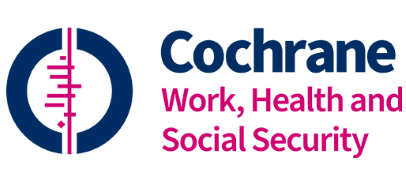กลุ่ม Work, Health, and Social Security Thematic Group มุ่งเน้นการจัดการประเด็นที่เกี่ยวข้องกับสุขภาพในด้านอาชีวอนามัยและประกันสังคม
เกี่ยวกับเรา

ในบริบทของกลุ่มThematic Group ของเรา ประกันสังคมครอบคลุมโดยเฉพาะอย่างยิ่งประเด็นทางการแพทย์ที่เกี่ยวข้องกับการประกันทุพพลภาพ (เช่น การทุพพลภาพจากการทำงาน) และการประกันอุบัติเหตุ (เช่น ความเสียหายต่อสุขภาพที่เกิดจากการบาดเจ็บ) ในบางประเทศ ความเชี่ยวชาญเฉพาะทางนี้เรียกว่า 'เวชศาสตร์การประกันภัย'
กลุ่ม Thematic Group ของเราเป็นผลมาจากความร่วมมืออันยาวนานระหว่าง Cochrane Work Review Group และ ) Cochrane Insurance Medicine Field (CIM) ซึ่งทั้งสองหน่วยงานต่างมีประสบการณ์และความเชี่ยวชาญอย่างกว้างขวางในด้านการสังเคราะห์หลักฐานเชิงประจักษ์ การพัฒนาวิธีการ และการถ่ายทอดและเผยแพร่ความรู้ กลุ่ม Thematic Group ของเราตระหนักถึงความท้าทายที่เพิ่มมากขึ้นอันเนื่องมาจากการมีประชากรวัยทำงานที่สูงอายุขึ้น เช่น ความชุกของโรคเรื้อรังที่เพิ่มสูงขึ้นในกลุ่มประชากรวัยทำงาน กลุ่ม Thematic Group ของเรามีเป้าหมายเพื่อลดความทุพพลภาพที่เกี่ยวข้องกับการทำงานและอุบัติเหตุ และเพื่อเพิ่มการมีส่วนร่วมในการทำงานและการมีส่วนร่วมทางสังคม ขณะเดียวกันก็สร้างหลักประกันความมั่นคงทางรายได้สำหรับผู้ที่ไม่สามารถทำงานได้เนื่องจากปัญหาสุขภาพ
การทบทวนวรรณกรรมอย่างเป็นระบบและการสังเคราะห์หลักฐานเชิงประจักษ์ (Cochrane Work)
กลุ่มนี้ดำเนินการ สนับสนุน และ (ร่วม) จัดทำการสังเคราะห์หลักฐานเชิงประจักษ์เพื่อใช้เป็นข้อมูลสำหรับแนวปฏิบัติที่ดีที่สุดในด้านอาชีวอนามัยและประกันสังคม กิจกรรมของ Cochrane Work จะยังคงดำเนินต่อไป ซึ่งรวมถึงหัวข้อเกี่ยวกับประสิทธิผลของมาตรการด้านอาชีวอนามัย โดยเน้นที่การป้องกัน การรักษา การจัดการ และการฟื้นฟูสมรรถภาพ เมื่อไม่นานมานี้ เรายังได้ศึกษาประเด็นเกี่ยวกับการพยากรณ์โรคด้วย การทบทวนวรรณกรรมอย่างเป็นระบบที่คัดเลือกมาดังต่อไปนี้ เป็นตัวอย่างผลงานของกลุ่มเราในการรวบรวมหลักฐานเชิงประจักษ์จากหัวข้อที่หลากหลาย:
- การมีส่วนร่วมในการทำงาน : การศึกษากลยุทธ์เพื่อสนับสนุนบุคคลที่มีปัญหาสุขภาพให้สามารถทำงานต่อไปได้
 แนวทางที่ไม่ใช่ทางการแพทย์เพื่อสนับสนุนการกลับเข้าทำงานของผู้ป่วยมะเร็ง
แนวทางที่ไม่ใช่ทางการแพทย์เพื่อสนับสนุนการกลับเข้าทำงานของผู้ป่วยมะเร็ง- โปรแกรมการประสานงานเพื่อปรับปรุงการกลับเข้าทำงานสำหรับคนทำงานที่อยู่ระหว่างการลาป่วย
- วิธีการส่งเสริมการกลับเข้าทำงานสำหรับผู้ป่วยโรคซึมเศร้า
- วิธีการเพื่อการเข้าสู่และการคงอยู่ในการจ้างงานสำหรับผู้ใหญ่ที่มีภาวะเจ็บป่วยทางจิตอย่างรุนแรง: การวิเคราะห์อภิมานแบบเครือข่าย
- การป้องกันโรคจากการทำงานและโรคที่เกี่ยวเนื่องจากการทำงาน: การระบุมาตรการที่มีประสิทธิผลเพื่อลดความเสี่ยงต่อสุขภาพที่เกี่ยวข้องกับสถานที่ทำงาน
- มาตรการระดับบุคคลเพื่อลดความเครียดจากการทำงานในบุคลากรทางการแพทย์
- ระบบประเมินการลดทอนเสียงของอุปกรณ์ป้องกันการได้ยินภาคสนามและการฝึกอบรมที่เกี่ยวข้องเพื่อลดการสัมผัสเสียงดังของผู้ปฏิบัติงาน
- อุปกรณ์ป้องกันส่วนบุคคล (PPE) เพื่อป้องกันการสัมผัสแร่ใยหินในผู้ปฏิบัติงาน
- มาตรการระดับองค์กรเพื่อป้องกันและลดความก้าวร้าวที่มุ่งต่อบุคลากรทางการแพทย์จากผู้ป่วยและผู้แทนผู้ป่วย
- การส่งเสริมสุขภาพในสถานประกอบการ: การประเมินผลโครงการที่ออกแบบมาเพื่อส่งเสริมสุขภาวะโดยรวมของพนักงาน
- ความเสี่ยงด้านสุขภาพและความปลอดภัยในที่ทำงาน: การประเมินผลกระทบของอันตรายต่างๆ ในที่ทำงานต่อผลลัพธ์ทางสุขภาพในระยะยาว
ประกันสังคมและเวชศาสตร์ประกันภัย
ส่วนงานด้านประกันสังคมของเรามุ่งเน้นไปที่การจัดหาหลักฐานที่น่าเชื่อถือเพื่อสนับสนุนกระบวนการตัดสินใจทางการแพทย์ในด้านการประกันทุพพลภาพและการประกันอุบัติเหตุ ซึ่งรวมถึงการให้ข้อมูลที่เชื่อถือได้แก่แพทย์ ผู้รับประกันภัย และผู้เชี่ยวชาญทางการแพทย์ เพื่อใช้ประกอบการประเมินความสามารถในการทำงานของผู้ป่วยและการพิจารณาใบรับรองแพทย์เพื่อการประกัน โดยการเผยแพร่หลักฐานคุณภาพสูงที่เข้าถึงได้ง่าย กลุ่มฯ ทำให้มั่นใจว่าข้อเสนอแนะที่จัดทำขึ้นในเวชศาสตร์ประกันภัยนั้นมีความถูกต้องแม่นยำและเชื่อถือได้
ความร่วมมือและการนำความรู้ไปใช้
วัตถุประสงค์หลักของกลุ่ม Thematic Group ของเราคือการส่งเสริมความร่วมมือระหว่างนักวิจัย ผู้ปฏิบัติงาน และผู้กำหนดนโยบายในสาขาอาชีวอนามัยและประกันสังคม ความร่วมมือนี้จำเป็นอย่างยิ่งต่อการนำหลักฐานไปสู่การปฏิบัติให้ประสบผลสำเร็จ เพื่อให้มั่นใจว่าผลการวิจัยล่าสุดได้รับการแบ่งปันและนำไปใช้อย่างมีประสิทธิผลโดยผู้มีส่วนได้ส่วนเสียทั่วโลก เครือข่ายผู้เชี่ยวชาญของกลุ่มมีบทบาทสำคัญในกิจกรรมการนำความรู้ไปใช้ โดยส่งเสริมการนำแนวปฏิบัติที่อิงตามหลักฐานไปใช้อย่างแพร่หลายในด้านการทำงาน สุขภาพ และประกันสังคม
มุมความรู้จาก Cochrane Insurance Medicine
- กลุ่มอาการปวดซับซ้อนเฉพาะที่ (CRPS): มีทางเลือกในการรักษามากมาย แต่มีหลักฐานสนับสนุนน้อย
- การกระตุ้นไขสันหลังสำหรับอาการปวดหลังเรื้อรัง
- การตัดสินใจเรื่องความคุ้มครองโดยผู้รับประกันภัย: กรอบการพิจารณาจากหลักฐานสู่การตัดสินใจ โดยใช้ตัวอย่างของการกระตุ้นเส้นประสาทด้วยไฟฟ้าผ่านผิวหนัง (TENS) สำหรับการรักษาอาการปวดเส้นประสาท
- การรักษาด้วยการผ่าตัดหรือการรักษาแบบประคับประคองสำหรับภาวะเส้นเอ็นหัวไหล่ถูกกดทับ
แนวทางแบบสหสาขาวิชาชีพ
กลุ่ม Thematic Group ของเราได้รับประโยชน์จากการมีส่วนร่วมของทีมงานแบบสหสาขาวิชาชีพที่มีพลวัต ซึ่งประกอบด้วยผู้เขียนและนักวิจัยผู้มีประสบการณ์กว้างขวางในด้านการสังเคราะห์หลักฐาน ความเชี่ยวชาญของพวกเขากครอบคลุมหลากหลายสาขาวิชา รวมถึงอาชีวอนามัย ประกันสังคม เวชศาสตร์ประกันภัย และการปฏิบัติที่อิงตามหลักฐาน ความเชี่ยวชาญที่กว้างขวางนี้ช่วยให้กลุ่มสามารถจัดการกับประเด็นที่ซับซ้อนจากหลากหลายมุมมอง เพื่อให้มั่นใจถึงการทบทวนที่ครอบคลุมและรอบด้านซึ่งพิจารณาปัจจัยที่เกี่ยวข้องทั้งหมด
ทีมของเรา
- Prof. Karen Walseth Hara, PhD, MD, Dept. of Public Health and Nursing, Norwegian University of Technology and Science, Trondheim (NTNU), Norway
- Dr. Jan Hoving, PhD, Dept. of Public and Occupational Health (POH) & KCVG, Amsterdam UMC, Amsterdam, the Netherlands
- Prof. Dr. Regina Kunz, MD, Evidence-based Insurance Medicine (EbIM) Unit, Division of Clinical Research, Department of Clinical Research, University of Basel and University Hospital Basel, Switzerland
- Steve McCrosky, Evidence-based Insurance Medicine (EbIM) Unit, Division of Clinical Research , Department of Clinical Research, University of Basel and University Hospital Basel, Switzerland
- Prof. Dr. Damien McElvenny, University of Manchester, Manchester, UK
- Jessica Thomas BSc (Hons), PGD, Amsterdam UMC, Amsterdam, The Netherlands
แผนงานของเรา
ภารกิจหลักของกลุ่ม Thematic Group ของเราคือการมีส่วนร่วมในการตัดสินใจที่อิงตามหลักฐานในด้านการทำงาน สุขภาพ และประกันสังคม โดยมุ่งเน้นที่การส่งเสริมการมีส่วนร่วมในการทำงาน ความปลอดภัยและอาชีวอนามัย การเข้าถึงประกันสังคมอย่างเป็นธรรมในกรณีทุพพลภาพจากการทำงาน และสุขภาวะที่ดีในการทำงาน
วัตถุประสงค์เฉพาะสำหรับอนาคตอันใกล้
- การสนับสนุนการสังเคราะห์หลักฐานคุณภาพสูง: การมุ่งเน้นการจัดทำการทบทวนวรรณกรรมอย่างเป็นระบบในประเด็นที่มีลำดับความสำคัญสูงภายในขอบเขตด้านการทำงาน อาชีวอนามัย และประกันสังคม
- การระบุหัวข้อที่มีลำดับความสำคัญ: การระบุหัวข้อหลักอย่างเป็นระบบสำหรับการทบทวนวรรณกรรมอย่างเป็นระบบและการวิจัยปฐมภูมิ (primary research) ในด้านการทำงาน สุขภาพ และประกันสังคม ซึ่งจะได้รับการยืนยันผ่านการสำรวจระหว่างประเทศ (กำลังดำเนินการ)
- การมีส่วนร่วมในการพัฒนาวิธีการเพื่อสนับสนุนการสังเคราะห์หลักฐาน: การพัฒนาและปรับปรุงเครื่องมือ แนวทางการรายงานผล และการสร้างความสอดคล้องของวิธีการในสาขานี้ เช่น ชุดผลลัพธ์หลักสำหรับการทำงาน (Core Outcome Set for Work) ( COSforWork.org) สำหรับใช้ในการศึกษาเชิงแทรกแซงที่มีผลลัพธ์ด้านการทำงาน
- ความร่วมมือและการเผยแพร่ในระดับโลก ระดับชาติ และระดับภูมิภาค: การร่วมมือกับพันธมิตรระดับโลก เช่น 'Evidence for Work', EUMASS หรือ International Commission on Occupational Health (ICOH) เพื่อเผยแพร่หลักฐานจาก Cochrane และส่งเสริมกิจกรรมของกลุ่มในระดับนานาชาติ
- โครงการริเริ่มด้านการศึกษา: การจัดหาโอกาสทางการศึกษาอย่างต่อเนื่อง โดยมุ่งเน้นวิธีการของ Cochrane และการดูแลที่อิงตามหลักฐาน ภายใต้หลักสูตรฝึกอบรมวิชาชีพ
- การยื่นขอทุนสนับสนุน: การค้นหาและยื่นขอทุนสนับสนุนสำหรับโครงการหรือทุนสนับสนุนโครงสร้างพื้นฐาน เพื่อสนับสนุนกิจกรรมของกลุ่ม
ติดต่อเรา
สำหรับข้อมูลเพิ่มเติมเกี่ยวกับงานของเรา โปรดติดต่อทางอีเมล
The Work, Health, and Social Security Thematic Group is dedicated to addressing health-related topics in occupational health and social security.
About us

In the context of our Thematic Group, social security covers in particular medical issues related to disability insurance (for example, work disability) and to accident insurance (for example, health damage caused by injuries). In some countries, this specialty is referred to as 'insurance medicine'.
Our Thematic Group represents a long-standing collaboration between the Cochrane Work Review Group and the Cochrane Insurance Medicine Field (CIM), both of which bring extensive experience and expertise in evidence synthesis, methods development, and knowledge translation and dissemination. Our Thematic Group recognizes the growing challenges posed by an ageing workforce, such as an increasing prevalence of chronic diseases in the working population. Our Thematic Group aims to reduce work- and accident-related disabilities, and to improve work participation and social participation, while ensuring income security for those unable to work due to poor health.
Systematic reviews and evidence synthesis (Cochrane Work)
The group conducts, supports and (co)-authors evidence syntheses that inform best practices in occupational health and social security. Cochrane Work's activities will continue, including topics about the effectiveness of occupational health interventions with a focus on prevention, treatment, management, and rehabilitation. Recently, we have also been addressing prognostic questions. The following selected systematic reviews represent our group’s work compiling evidence from a range of topics:
- Work participation: Investigating strategies to support individuals with impaired health in maintaining their employment.
- Non‐medical interventions to enhance return to work for people with cancer
- Return‐to‐work coordination programmes for improving return to work in workers on sick leave
- Interventions to improve return to work in depressed people
- Interventions for obtaining and maintaining employment in adults with severe mental illness, a network meta‐analysis
- Prevention of occupational and work-related diseases: Identifying effective interventions to minimize workplace-related health risks.
- Individual‐level interventions for reducing occupational stress in healthcare workers
- Hearing protection field attenuation estimation systems and associated training for reducing workers’ exposure to noise
- Personal protective equipment for preventing asbestos exposure in workers
- Organisational interventions for preventing and minimizing aggression directed towards healthcare workers by patients and patient advocates
- Health promotion in the workplace: Evaluating programmes designed to enhance the overall wellbeing of employees.
- Health and safety risks from workplace exposures: Assessing the impact of various workplace hazards on long-term health outcomes.
Social security and insurance medicine
Our social security component focuses on providing robust evidence to support medical decision-making processes in the fields of disability and accident insurance. This includes supplying physicians, insurers, and medical experts with reliable data to inform their assessments of patients' work capacities and the insurance of sick notes. By disseminating high-quality evidence that is easy to access, the group ensures that the recommendations made in insurance medicine are both valid and reliable.
Collaboration and knowledge translation
A key objective of our Thematic Group is to foster collaboration among researchers, practitioners, and policymakers in the fields of occupational health and social security. This collaboration is essential for the successful translation of evidence into practice, ensuring that the latest research findings are effectively shared with and used by stakeholders across the globe. The group's network of experts plays a crucial role in knowledge translation activities, promoting the widespread adoption of evidence-based practices in work, health, and social security.
Cochrane Corners from Cochrane Insurance Medicine
- Complex regional pain syndrome: many treatment options, little evidence
- Spinal cord stimulation for chronic back pain
- Coverage decisions by insurers: The evidence‐to‐decision framework, using the example of transcutaneous electrical nerve stimulation (TENS) for the treatment of neuropathic pain
- Surgical or conservative treatment for impingement of the rotator cuff?
Multidisciplinary approach
Our Thematic Group benefits from the input of a dynamic, multidisciplinary team of authors and researchers with extensive experience in evidence synthesis. Their expertise spans a range of disciplines, including occupational health, social security, insurance medicine, and evidence-based practice. This broad expertise allows the group to address complex issues from multiple perspectives, ensuring comprehensive and well-rounded reviews that consider all relevant factors.
Our team
- Prof. Karen Walseth Hara, PhD, MD, Dept. of Public Health and Nursing, Norwegian University of Technology and Science, Trondheim (NTNU), Norway
- Dr. Jan Hoving, PhD, Dept. of Public and Occupational Health (POH) & KCVG, Amsterdam UMC, Amsterdam, the Netherlands
- Prof. Dr. Regina Kunz, MD, Evidence-based Insurance Medicine (EbIM) Unit, Division of Clinical Research, Department of Clinical Research, University of Basel and University Hospital Basel, Switzerland
- Steve McCrosky, Evidence-based Insurance Medicine (EbIM) Unit, Division of Clinical Research , Department of Clinical Research, University of Basel and University Hospital Basel, Switzerland
- Prof. Dr. Damien McElvenny, University of Manchester, Manchester, UK
- Jessica Thomas BSc (Hons), PGD, Amsterdam UMC, Amsterdam, The Netherlands
Our plans
The overarching mission of our Thematic Group is to contribute to evidence-based decisions in work, health, and social security, with a focus on enhancing work participation, occupational safety and health, fair access to social security in case of work disability, and wellbeing at work.
Specific objectives for the near future
- Supporting high-quality evidence syntheses: Focusing on the production of systematic reviews in high-priority areas within work, occupational health, and social security.
- Identifying priority topics: Systematically identifying key topics for systematic reviews and primary research in work, health and social security that will be confirmed through an international survey (ongoing).
- Contributing to methods development to support evidence synthesis: Developing and refining tools, reporting guidelines and harmonization of methods in the field such as the Core Outcome Set for Work (COSforWork.org) for use in intervention studies with work outcomes.
- Global, national and regional partnerships and dissemination: Collaborating with global partners such as 'Evidence for Work', EUMASS or International Commission on Occupational Health (ICOH) to disseminate Cochrane evidence and promote the group's activities on an international scale.
- Educational initiatives: Continuing to provide educational opportunities focused on Cochrane methodologies and evidence-based care within professional training programmes.
- Grant applications: Identifying and submitting grant applications for projects or infrastructure funding to support the group's activities.
Contact us
For more information about our work, please get in touch by email.

